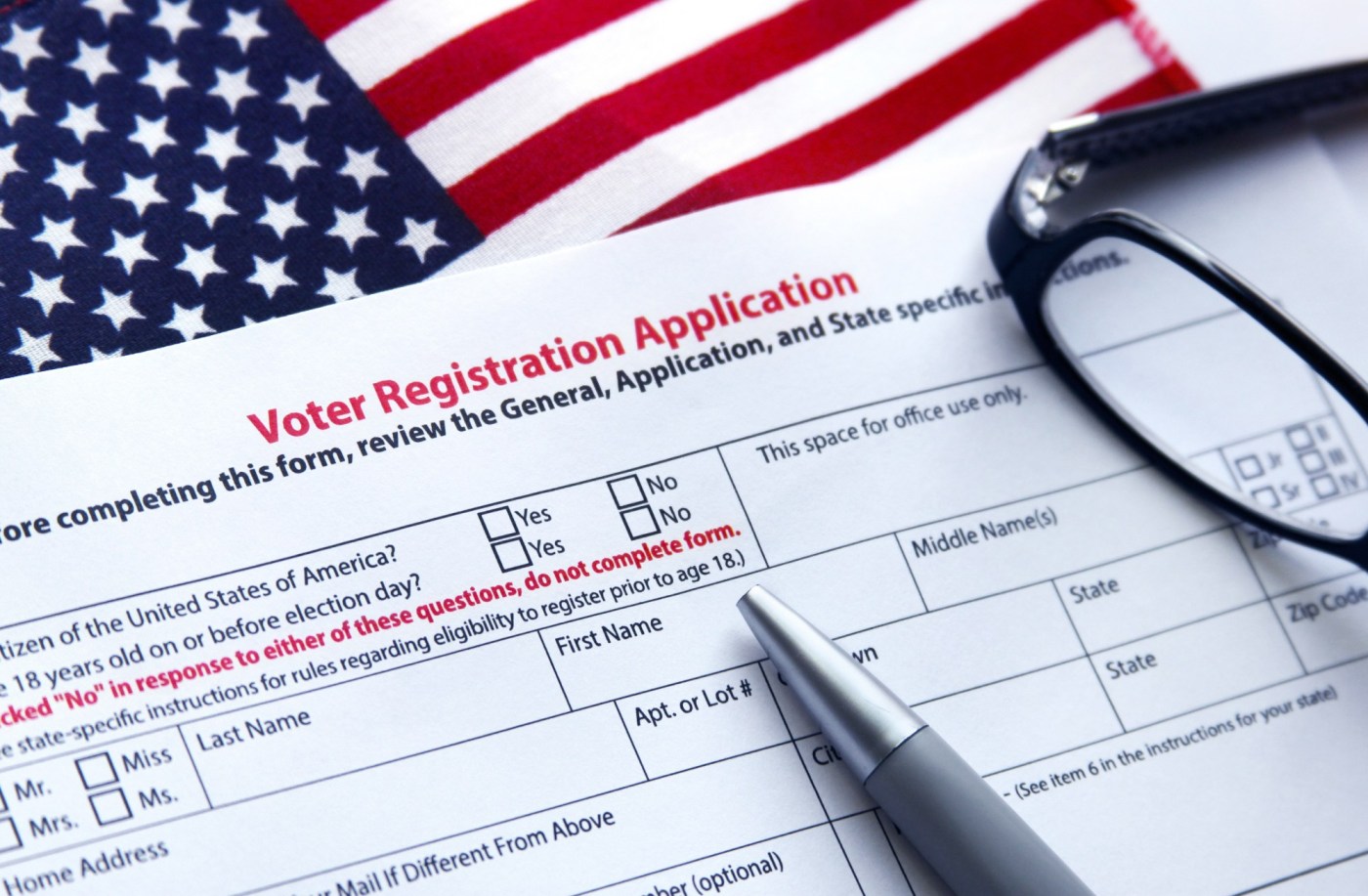A lawsuit filed by a conservative legal group against California voting officials takes aim at the state’s “make-it-easy” approach to voting.
In May, Judicial Watch, on behalf of the Libertarian Party of California, sued California Secretary of State Shirley Weber and the state itself — and listed 27 registrars, including Orange, Riverside and San Bernardino counties — claiming that officials violated federal law between 2020 and 2022 by not adequately purging voting rolls of so-called irregular voters. Specifically, Judicial Watch argues that officials haven’t lived up to rules established by the National Voter Registration Act of 1993, the “motor voter” law aimed at making voter registration easier and voter rolls more accurate and up-to-date.
Though the lawsuit doesn’t cite any evidence showing significant numbers of votes being illegally cast or counted — and no evidence exists to support widespread voter fraud — Judicial Watch argues that officials upped the odds for voter fraud by not expunging the names of irregular voters in the manner required under federal law.
Purging ineligible voters from state voter rolls was a hot topic during the just concluded election season, sparking debates about ballot security and voter access.
Conservative groups have fueled doubts of the legitimacy of recent elections, particularly after President Joe Biden defeated former President Donald Trump in 2020. And this year, prior to the November election in which Trump beat Vice President Kamala Harris, Trump claimed without evidence that his opponents were engaged in cheating. One of the related efforts, taken up by conservative groups including the Republican National Committee, has been the challenge of voter roll maintenance.
Robert Popper, an attorney for Judicial Watch, said the group has never alleged fraud in its lawsuits but that outdated voter rolls create opportunities for it.
“The point isn’t fraud, but these removals do affect the potential for fraud in several ways,” he said.
Popper argued that outdated registrations, such as those for people who have moved or died, open the door to potential voter fraud, including voter impersonation or double voting — both of which are felonies in California.
“All of the opportunities for these kinds of fraud diminish when you conduct voter list maintenance and get rid of outdated registration,” Popper said.
The problem Popper’s group hopes to stamp out is almost non-existent. In California, a state with about 22.6 million registered voters, there were 64 known cases of voter impersonation or double voting over the past two decades, according to research by the Heritage Foundation.
Legal experts say the claim that counties are endangering election integrity by having more registered voters than voting-age citizens — a key to the Judicial Watch lawsuit — is based on flawed methodology.
“It compares apples to oranges,” said Justin Levitt, a Loyola Law School professor. “It’s a little like complaining that your odometer doesn’t align with your speedometer — they exist to measure two different things.”
Levitt also noted that leaving inactive voters on the rolls serves as a safeguard to make sure eligible voters aren’t removed by mistake.
The specific complaints in the lawsuit regarding voter rolls for Orange, Riverside and San Bernardino counties in the lawsuit are as follows:
Orange County
Judicial Watch alleged Orange County is among 19 California counties that did not report any data about the number of voter registrations canceled from November 2020 to November 2022.
According to a letter from the state Department of Justice, Orange County did report removing 77,691 voter registrations during that time. However, because the county couldn’t identify the exact number of voters removed who didn’t respond to notices asking them to confirm their address or those who hadn’t voted in two consecutive federal elections — a rule known as Section 8(d)(1)(B) of the NVRA — the registrar reported that the data was unavailable.
That answer is consistent with the federal Election Administration and Voting Survey, which is conducted by the U.S. Election Assistance Commission as a way to gather data from election jurisdictions across the country.
The federal voting survey allows counties to report certain data as “unavailable” if necessary and to provide an explanation why that is the case. That option explains why Orange County marked the data on the Section 8(d)(1)(B) removals as “unavailable.”
Bob Page, the county registrar, said he cannot speak to the merits of the claims made by Judicial Watch since the county is not a direct party to the lawsuit. But he pointed to an explainer on the registrar’s website that details how the the office maintains its voter registration file.
Page and Keith Bogardus, the chief assistant district attorney, also said in a briefing to reporters before Election Day that since Page took control of the office in 2022 there have been no cases of individuals prosecuted for trying to vote multiple times or impersonate other voters.
Riverside County
It was the same situation in Riverside County, where the registrar was unable to determine the total number of removals under Section 8(d)(1)(B) using the county’s existing data system and reported that the data was unavailable.
According to the justice department, the county estimated that during the two-year window listed in the lawsuit 750 voters were removed under Section 8(d)(1)(B).
When reached for comment, Riverside County spokesperson Elizabeth Florer referred inquiries to the secretary of state’s office, which said it doesn’t comment on ongoing litigation to “protect the integrity” of the process.
San Bernardino County
Related Articles
Democrat Adam Gray wins election to U.S. House in California’s 13th Congressional District, beating incumbent John Duarte
Who’s going to run Oakland when Mayor Sheng Thao leaves? Your biggest questions answered
Cupertino City Council: Ray Wang appears to have won a second seat
California Democrats open special session to Trump-proof state priorities
Outgoing Alameda County DA once again accused of using felony prosecution as a political wedge
According to the justice department, San Bernardino County follows a “general program” of notifying inactive registrants under Section 8(d)(1)(B) and removes records when people move or sit out two consecutive elections or don’t contact the registrar to correct their address.
In the 2020-2022 reporting period, however, the county was unable to remove registration records because it determined that its notices did not use the specific language required under the federal motor voter law.
San Bernardino County, which has 1.2 million registered voters, issued more than 200,000 new notices in 2023, according to the justice department.
When reached for comment, registrar spokesperson Melissa Eickman said the county cannot comment on the specific allegations contained in the lawsuit, but that the registrar is “in compliance with the law.”
Secretary of state response
While the secretary of state’s office declined to comment for the story, it said in a letter sent Sept. 27 to all county clerks and registrars that mass challenges of voter eligibility recently submitted to election offices are “not authorized.”
“First, we are well into the 90-day quiet period where such activities are prohibited,” the letter said, alluding to a blackout period mandated by federal law that limits when election officials can change their voter rolls unless a registrant requests asks to be removed.
Another issue raised in the letter is that information submitted by any third party, including Judicial Watch, can’t be the sole reason to expunge a registered voter. Information submitted by a third party does not constitute a “removal at the request of the registrant,” the secretary of state’s office wrote.
Levitt said private parties don’t have the ability to legally contest voter registration data that has been reported to the Election Assistance Commission.
“Even if there’s been a violation of a mandate, that’s not the sort of thing that private parties can enforce,” he said.
Popper said there should be no debate about his group’s claims in the lawsuit, which he said are “uncontroversial.”
“We look at voter rolls every year .. and they should just be following the law,” he said.
The state recently asked U.S. District Judge Mark C. Scarsi to dismiss the case, a move that is typical in civil lawsuits. If that request is denied, Popper said his group will seek a settlement similar to deals it has struck in previous lawsuits.
In 2019, Judicial Watch sued Los Angeles County over similar questions raised in the current legal tussle, and that litigation resulted in the state and county agreeing to purge more than 1 million inactive voter registrations.












